新概念英语青少版3B Unit 18
青少版新概念英语3B-第18单元Unit18

K: Oh, is that ___! You _______ me . W: Do you mean ___you don’t mind ? K: Of course I don’t _____ ! Why would I _____ ? Karate’s a _____ , isn’t it ?
R: Dad! Have you asked mum yet ? W: What about ? R: Have you asked mum if I can start karate lessons ? W: No,I haven’t . I’ll … Shh! She’s coming .
R: Dad! Have you ____mum yet ? W: ____ ____? R: Have you asked mum __I can start ____ ____? W: No,I _____ . I’ll … Shh! She’s _____ .
---Has Claire found a job? ---I'll ask / find out if she's found a job.
---I must know whether Claire's found a job or not.
Conclusion(复习篇)
She says (that) she‘s lost her purse
.
K:What’s the mystery? Is Robert ___ ___? W: He’s fine . He just ____ me __ ___you something . K: Why doesn’t he ask me _____ ? W: He’s afraid ___ you’ll say no
新概念英语第三册Lesson18(共30张PPT)

Rarely = seldom
adv.尤其是具有否定意义的adv.置于句首,会 引起部分倒装
Rarely has he been so happy for years. Seldom have I watched a film so touching as Titanic. Hardly can I trust him !
2.n. 思潮,潮流;趋势,倾向
the great current of events 天下大势。
go with /against the current of the times 顺应/违反时势
current adj. 当前的,通用的,流行的
current affairs/news 当前时事 current fashion current account 活期存款 thw current animal year 本命年 the current price /rate 时价,成交价
emotionally adv.感情上
emotional adj.易激动的, 感情脆弱的 (unemotional) Women are often said to be more emotional than men. emotive [iˈməʊtɪv] adj.使感动的, , 动感情的 The word home is more emotive than house. emotion n.(抽象的)感情 Love, hated, and grief悲伤 are emotions. feeling n.某时的内心感受 I can't describe my feeling now.
fl- 移动的光 flicker 摇曳 to shine with unstready light The candle flickered in the wind. flash 闪光 to shine suddenly and brightly for a short time flash on and off 忽明忽暗 a flash of hope 一线希望 flash of lightning 闪电 flash of wit 灵机一动,突然出现的机智。 a flash in the pan 空枪;昙花一现(的人)。 in a flash 即刻,一刹那间 flare v./n.闪耀,闪光 flame n/v.火焰,发出火焰
新概念第三册第18课
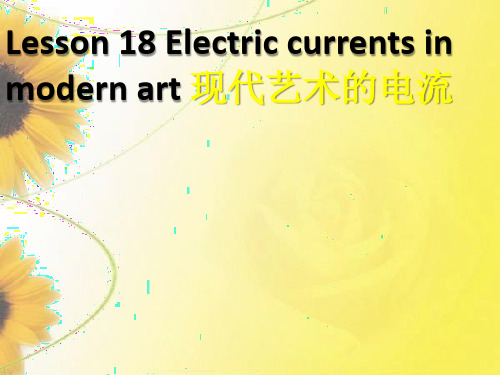
fl- 移动的光 flicker v. 闪烁 shine unsteadily flash v. 闪光 shine for a moment flash on and off 忽明忽暗 flame v. 焚烧;泛红;n. 火焰 Her face flamed red with embarrassment. old flame 旧情人 gl- 不移动的光 glare vt. 瞪视;发眩光 The tropic sun glared down on us all day. glitter vi. (在阳光照耀下)闪光;闪烁 All that glitters is not gold is a well-known saying, meaning that not everything that looks precious or true turns out to be so. This can apply to people, places, or things that promise to be more than they really are. But gold will glitter forever.
• 1.Since they emit light directly, OLED displays do not need a backlight. • 由于也是自身发光,OLED显示器可以不用背光 灯。 • 2.Industries that emit carbon dioxide [daɪ'ɑksaɪd] would have to buy permits to do so. • 排放二氧化碳的产业必须要购买排放量之类的。 • 3.Earthquakes emit three types of waves which have their own characteristics. • 地震发出两种波,它们有各自的特征。
新概念青少版3Bunit18

Do you mind?
I don’t think(that) she will let me learn karate. I am afraid (that) She won’t let me learn karate. I am sure (that) she’ll say no.
Unit18 Learning the rules! Lena
Robert : Dad! Have you asked Mum yet? William : What about? Robert : Have you asked Mum if I can start karate lessons? William : No, I haven't. I'll... Shh! She's coming!
you something.
Karen: Why doesn’t he ask me himself?
William : He's afraid that you'll say no.
afraid adj. 害怕的;恐怕; 担心的
She did not seem at all afraid. 她一点儿也没显得害怕。
whisper ['wɪspɚ] n. 私语;谣 传vi. 耳语;vt. 低声说出
It fell upon my heart like
a sigh of her body and whisper of her heart. 它落在 我的心上,像她的身躯的叹息 和她心灵的低语。
新概念英语第三册第18课-Electric currents in modern art
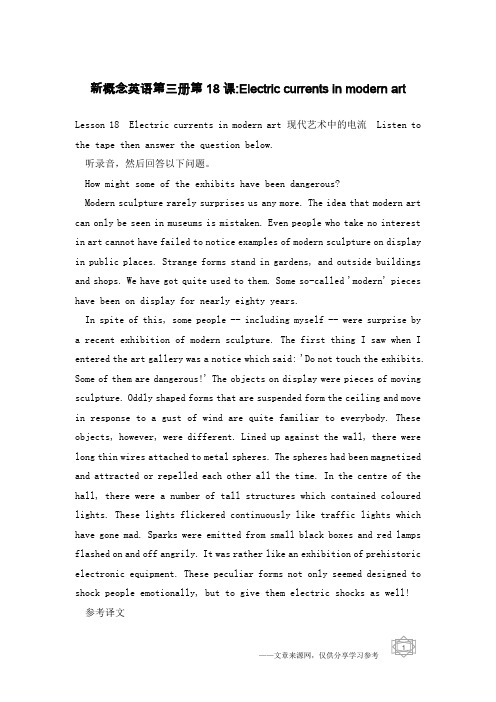
新概念英语第三册第18课:Electric currents in modern artLesson 18 Electric currents in modern art 现代艺术中的电流 Listen to the tape then answer the question below.听录音,然后回答以下问题。
How might some of the exhibits have been dangerous?Modern sculpture rarely surprises us any more. The idea that modern art can only be seen in museums is mistaken. Even people who take no interest in art cannot have failed to notice examples of modern sculpture on display in public places. Strange forms stand in gardens, and outside buildings and shops. We have got quite used to them. Some so-called 'modern' pieces have been on display for nearly eighty years.In spite of this, some people -- including myself -- were surprise by a recent exhibition of modern sculpture. The first thing I saw when I entered the art gallery was a notice which said: 'Do not touch the exhibits. Some of them are dangerous!' The objects on display were pieces of moving sculpture. Oddly shaped forms that are suspended form the ceiling and move in response to a gust of wind are quite familiar to everybody. These objects, however, were different. Lined up against the wall, there were long thin wires attached to metal spheres. The spheres had been magnetized and attracted or repelled each other all the time. In the centre of the hall, there were a number of tall structures which contained coloured lights. These lights flickered continuously like traffic lights which have gone mad. Sparks were emitted from small black boxes and red lamps flashed on and off angrily. It was rather like an exhibition of prehistoric electronic equipment. These peculiar forms not only seemed designed to shock people emotionally, but to give them electric shocks as well! 参考译文现代雕塑不再使我们感到惊讶了。
新概念英语第三册第18课-Electric currents in modern art

新概念英语第三册第18课:Electric currents in modern artLesson 18 Electric currents in modern art 现代艺术中的电流 Listen to the tape then answer the question below.听录音,然后回答以下问题。
How might some of the exhibits have been dangerous?Modern sculpture rarely surprises us any more. The idea that modern art can only be seen in museums is mistaken. Even people who take no interest in art cannot have failed to notice examples of modern sculpture on display in public places. Strange forms stand in gardens, and outside buildings and shops. We have got quite used to them. Some so-called 'modern' pieces have been on display for nearly eighty years.In spite of this, some people -- including myself -- were surprise by a recent exhibition of modern sculpture. The first thing I saw when I entered the art gallery was a notice which said: 'Do not touch the exhibits. Some of them are dangerous!' The objects on display were pieces of moving sculpture. Oddly shaped forms that are suspended form the ceiling and move in response to a gust of wind are quite familiar to everybody. These objects, however, were different. Lined up against the wall, there were long thin wires attached to metal spheres. The spheres had been magnetized and attracted or repelled each other all the time. In the centre of the hall, there were a number of tall structures which contained coloured lights. These lights flickered continuously like traffic lights which have gone mad. Sparks were emitted from small black boxes and red lamps flashed on and off angrily. It was rather like an exhibition of prehistoric electronic equipment. These peculiar forms not only seemed designed to shock people emotionally, but to give them electric shocks as well! 参考译文现代雕塑不再使我们感到惊讶了。
青少版新概念2B unit18

---------------------------------------------------------------最新资料推荐------------------------------------------------------青少版新概念2B unit18Unit 18Read the label !看标签!1/ 25Did ken install a telephone?Did the baby cuckoo eat the other eggs? What appeared in his garden last spring? When did the young cuckoo hatch? Who watched excitedly? The show was over,wasn’t?---------------------------------------------------------------最新资料推荐------------------------------------------------------ ? label [ ‘leib?l] n. 标签 ? lunchbox [‘l?nt?b?ks] n. 午餐饭盒 ? stuff [st?f] n. 东西 ? chemistry [‘kemistri] n. 化学;化学药品 ? plane [plein] n. 飞机 ? miss [mis] v. 错过 ? discover [dis‘k?v?] v. 发现 ? anyway [‘eniwei] adv. 无论如何 ? honestly [‘?nistli] adv. 诚实地 ? at the same time 同时 ? Yuk! [j?k] 呸!3/ 25? practice n. 练习 ? enough adj. 足够的 ? Happened---happen 的过去式 v. 发生 ? gave ----give的过去式 v. 给 ? Went---go 的过去式 v. 去 ? felt---feel 的过去式 v. 感觉 ? sick adj. 恶心 ? A bit----a little 一点儿 ? needed---need的过去式 v. 需要 ? ate—eat的过去式 v. 吃 ? One after another 一个接一个---------------------------------------------------------------最新资料推荐------------------------------------------------------ labelmissaboutpracticeanyway stuffplaneYuk5/ 25标签 1发现 2飞机 1化学 3 同时 3错过 1诚实的 2东西 1---------------------------------------------------------------最新资料推荐------------------------------------------------------ Listening to the recording, and then answer this question:Q1:Why did Vikki miss breakfast that morning?Because she did her piano practice before school.Q2:When did Vikki feel really sick?She felt really sick after She ate four Crispy Trolls.7/ 25Lucy1.VikkiOne of these is a student. Some of these are students.Lucy: Do you want one of these, Vikki? (一般现在时)Vikki: No, thanks!I ate some of those about a year ago.Once was enough!固定短语,“一次就够了!”---------------------------------------------------------------最新资料推荐------------------------------------------------------ 2、时间状语Lucy: Why? What happened?放动词短语之后Vikki: I missed breakfast that morning,because I did my piano practice before school./t/Mum gave me my lunchbox,and I went for the bus.表目的双宾语动词短语9/ 253、一般地点状语放在句首表介绍场景,讲述的顺序Vikki: On the school busI felt a bit sick.原形:feel 频率副词常放句末表“概括” 事情就是这样I always feel sick on buses,anyway.(一般现在时表永恒的事实)---------------------------------------------------------------最新资料推荐------------------------------------------------------ 4、need (sb.) to do sth. e.g: I need you to help me.Vikki: I needed to eat something. I looked in my lunchbox and discovered the Crispy trolls.11/ 255、Vikki: I ate four Crispy trolls, one after another.原形:eat固定短语:一个接一个地吃过去式:/red/At the same time I read the label on the packet.固定短语:同时---------------------------------------------------------------最新资料推荐------------------------------------------------------ 6、“厌恶”(感叹词)强调“sick”Vikki: Then I felt really sick! Yuk!Believe meHonestly, Lucy, this stuff isn’t food.It’s chemistry. Read the label.13/ 25LUCY: Do you want one of these,Vikki? VIKKI: No, thanks ! I ate some of those about a year ago . Once was enough ! LUCY: Why?What happened? VIKKI:I ate breakfast that morning, because I did my piano practice before school. Mum gave me my lunchbox, and I went for the bus. VIKKI:On the school bus I felt a bit sick.I always feel sick on buses, anyway .---------------------------------------------------------------最新资料推荐------------------------------------------------------ VIKKI:I needed to eat something. I looked in my lunchbox and discovered the Crispy Trolls.VIKKI:I ate four Crispy Trolls. one after another. At the same time I read the label on the packet. VIKKI: Then I felt really sick!Yuk! Honestly Lucy, this stuff isn’t food. It’s chemistry. Read the label!15/ 25UNIT 18LESSON 36---------------------------------------------------------------最新资料推荐------------------------------------------------------ pronunciation /ps/chops perhaps chips tips keeps/ts/parts waits cats carrots bats17/ 25pronunciation /ks/box six fox fix/sp/crisp gossip---------------------------------------------------------------最新资料推荐------------------------------------------------------ pronunciation /st/waste best must rest/sk/ask desk19/ 25sellv. 卖,出售library n. 图书馆 page n.页chemical n. 化学物品 fortnight n.两个周 Pairs n.巴黎---------------------------------------------------------------最新资料推荐------------------------------------------------------ InfinitiveSimple pastbuy----bought come----came do----did drive----drove eat----ate feel----felt fly----flew have----had21/ 25Infinitive Simple pastgo----went put----put read/ri:d/--read/red/ ride----rode see----saw sell----sold sit----sat---------------------------------------------------------------最新资料推荐------------------------------------------------------ boughtcame felt readdid flew sawdroveatewentput satsoldrodehad23/ 25sat in the garden (yesterday) ate an apple①Whatdid Ken do yesterday? did Ken sit in the garden?He sat in the garden and ate an apple.②WhenHe sat in the garden yesterday.①DidKen sit in the garden yesterday and eat an apple? you sit in the garden yesterday?Yes, he did.②DidYes, I did. I sat in the garden and ate an apple.---------------------------------------------------------------最新资料推荐------------------------------------------------------ Homework:1、完成第一部分的听读复习并签字;2、背诵单词(5个);3、复习P22内容并完成书面作业;25/ 25。
青少版新概念3B-unit18
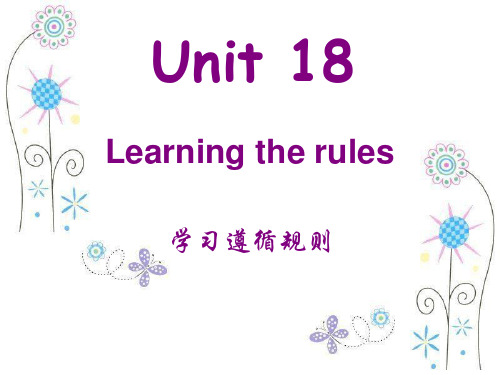
Learning the rules
学习遵循规则
whisper upstairs afraid
低语
在(往)楼上
担心的 是否
whether
fight wonder
打斗
想知道
低语
担心的 打斗 比较
根据汉语说出英 语单词.
想知道
是否
往楼上
空手道
afraid
Fight
whisper
mystery
Pronunciation
Please ask Mum pause if I can start karate lessons. I’ll find out pause whether she minds.
Pattern Practice
A: Has Claire found a job? B: I’ll ask her if she’s found one.
Pattern Practice
Listening
Homework
• • • • • • 1.听光盘5遍; 2.背课文; 3.抄写单词(4+1)听写; 4.抄写句子(2+1)听写; 5.完成课后练习; 6.家长签字。
Whether 与if 引导宾语从句,一般既可用whether也可用 if. 但是 (3)虽引导宾语从句,但为了强调宾语部分, 也可把从句放在句首,此时只用whether不用 if. Whether he will come I am not sure. 他是不是来我拿不准. (4)从句作介词宾语时只用whether不用if. It depends on whether it will be fine. 那得看是不是晴天.
Unit18Readthelabel!知识点(讲义)新概念英语青少版2B

Unit 18 Read the label! 看标签!一、重点单词及拓展:1. miss的用法1) 未击中;未得到;错过例:He threw the ball to me, but I missed it. 他把球扔给我,但我没接住。
I was late because I missed the bus. 我迟到了,因为我错过了公共汽车。
2)逃过;避开例:I was lucky to miss the traffic accident. 我很幸运躲过了车祸。
3)丢失例:When did you miss your pen? 你什么时候丢的钢笔?4)怀念;思念例:I'm sure that everybody will miss him very much. 我相信每个人都会怀念他。
注意:Miss表示未婚女性;年轻女教师missing既是miss的现在分词形式,也是形容词,表示丢失的,迷路了。
例:My marker was missing. 我的笔找不到了。
2.do + 名词/动名词的用法,可以代替单独的动词do my piano practice 练钢琴do some reading 做一些阅读do cleaning 打扫卫生do washing 洗衣服注意:这类短语要与go + 动名词短语区分开,如go shopping/swimming/fishing等也是固定用法,它们表示“去做......”。
造句练习1:1)快点,否则(or)你会错过公交车。
2)Tom,你怎么了?我丢了我的英语书。
3)晚饭后,我会和妈妈一起做一些阅读。
3.once的用法1)副词,一次;一遍;一倍例:We go to the pany once a day. 我们一天去公司一次。
He read this text only once yesterday. 这个课文他昨天只读了一遍。
2)副词,曾经;一度(常用于一般过去时)例:Once he learned some English. 他曾经学过一点英语。
新概念 青少版 3B unit18课件PPT

Role play
宾语从句(The Object Clause)
从句类型 陈述句
一般疑问句
主句动词
say… hope…know… think…believe
连接词 that
语序
don’t know… not sure... want to know… wonder… ask…
if / whether
you.
Object 宾语
I called him. He likes swimming. He does homework.
I love you. Debbie says that…
Debbie says that she loves you.
Subject Predicate
主语
谓语
Object 宾语
陈述句
一、引导词 1.that引导的宾语从句. (that无词义,非正式文
体可省) I think (that) I can watch TV now. I don’t think (that) you are right.
2. Whether/if引导的宾语从句. 译为“是否” I’ll ask him if (whether) he can come. 当句末出现“or not" 时, 只能用 whether
I know NewYork You need NewYork I know you need unique NewYork.
Tongue Twister
•1
Review Time
You say I guess
phone guest
tyre get on
pSPugwurryitosmmoecmnkaiwnsegirueigpmshootortl
新概念青少版_2B_unit_18(共25页) (2)
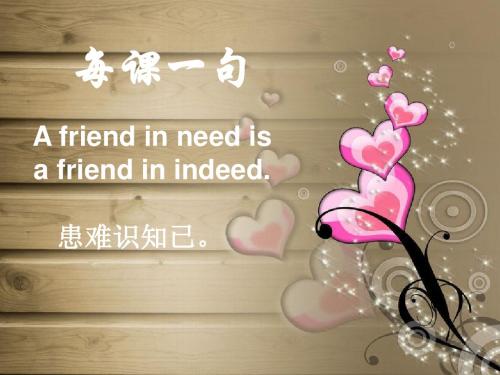
Yes, he did.
pusat tainshtehlef ugparden Did you sit in the garden yesterday? at luynecshtteimrdeaytoday Yes, I did. I sat in the garden and putasteomane abpopolkes on it ate an apple.
原型feel
I _a_l_w_a_y_s_feel sick on_b_u_s_e_s__,
bus 的复
_a_n_y_w_a_y_.
数形式
常放于句尾或句尾表示概括
事情就是这样
在肯定句中,a bit 和a little 用法相同,表示一点儿 Eg: You might say I am a bit silly.
What did Ken do yesterday? He sat in the garden and ate an apple.
When did Ken sit in the garden? He sat in the garden yesterday.
Did Ken sit in the garden yesterday and eat an apple?
Vikki: Then I felt _r_e_a_l_l_y_sick! Yuk!
强调
非正式的说法
Honestly, Lucy, this __s_tu__ff_isn’t_f_o_o_d_.
It’s_c_h_e_m__i_s_t_ry__. 不可数名词前使用
Read the label.
零冠词表示类别
discovered,规则变化的过去式
新概念青少版-3Bunit18
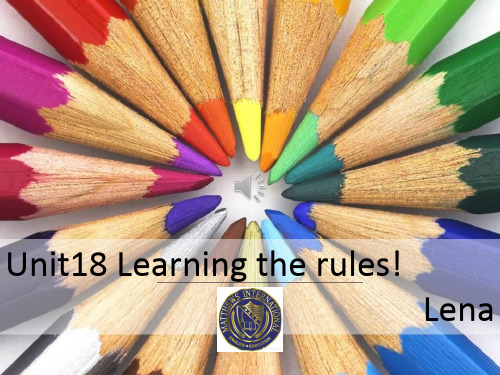
Karen: Oh, dear! What is it, William? William : Robert wants to learn karate. He doesn't know whether you'll let him.
want to想要做;想 要… We want to be quite clear on this point. 关于这一点,我们要 完全弄清。
Ed asked Paul* if he can ski. He want to know * whether Paul will join the program. Claire’s not sure * whether she’ll stay at the library. Lucy will say * if she needs some help. Can you find out * if Nina still seeing Alan
William: It's a martial art! It's about fighting! Karen: All competitions are a kind of fighting. The martial arts are also about rules!
新概念英语青少版_2B全单元课件_unit_18(共25页).ppt
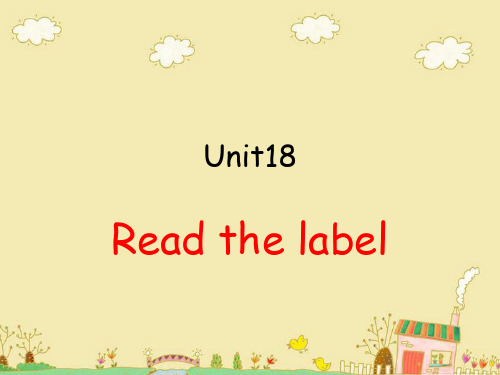
•Thank you!!!
• do my piano/ guitar /… practice. • Do the dishes. • Do some shopping • Do some cleaning
• balel • miss • lunchtime • discover • at the same time • honestly=to be honest. 老实说 • stuff • chemistry • plane • Yuk
• need to do … • I need to do some cleaning. • need do… • I needn’t do the dishes.
Read after the recording
Grammar
• Ken sat in the garden and ate an apple yesterday.
用于一般过去时的时间状语
1.与ago 连用:
a moment
two minutes
three hours
five days
ago
one week
six months
four years
last
time night week month term Monday
morning
yesterday afternoon
evening the day before yesterday
4.与one 连用: morning
one
evening day
Monday afternoon
5.与that 连用:
that
morning winter day year
6.其他时间状语:
Unit 18 Lesson 36(课件)-2023-2024 学年新概念英语青少版 2B

Then I ____f_e_l_t___ really sick! Yuk! _H__o_n__e_s_t_l_y______ Lucy, this stuff ______is_n__’_t food. It’s chemistry. __R__e_a_d____ the label!
sold his old car (about a year ago) bought another one William sold his old car and bought another one about a year ago.
A: Did William sell his old car and buy another one about a year ago? B:Yes, he did.
Robert put a shelf up and put some books on it at lunchtime today.
saw an old film
The boys went to the cinema and saw an old film last Saturday.
Pattern Practice
LUCY: Why? What happened? VIKKI:I ______a_t_e___ breakfast that morning,
because I ____d_i_d_____ ___m__y______ ___p_i_a__n_o___ practice before school. Mum ____g__a_v_e___ me my lunchbox, and I ______w__e_n__t for the bus.
008 新概念英语青少版3B 教案

Unit 16 Paul emails home类型内容重点单词及拓展 1. climb【释义】动词攀登【辨析】climb up 向上爬,攀登climb down下来,趴下来climber登山者2. cheaply【释义】副词便宜地【辨析】cheapness廉价3. less【释义】形容词较少的(less的比较级)副词较少地,较小地4.still【释义】副词仍然形容词静止的名词寂静4.ski to +地点【释义】滑雪去某地5. be able to【释义】能,会,能够6.ask sb to do sth【释义】要求某人做某事【辨析】ask sb not to do sth要求某人不要做某事重点句型 1.I ask him to close the door.2.I ask him not to close the door.3.I told him to close the door.4.I told him not to close the door重点语法【名称】双宾语结构【构成】主语+及物谓语动词+间接宾语(人)+直接宾语(物)E.g: He brings me a gift.主语+及物谓语动词+直接宾语(物)+to/for+间接宾语(人)E.g: He brings a gift to me.用to侧重指动作的方向,表示朝着,向着,对着某人。
用for侧重指动作的受益者,表示为了某人,替某人。
常跟双宾语的动词有:需借助t o的bring, give, lend, hand, pass, pay, promise, return, send, show, teach,tell, write, ask,等。
需借助for的buy, call, cook, choose, draw, find, get, make, order, sing, save, spare,等。
家庭作业 1.听读课文20分钟2.抄写单词2遍3.练习册4.背单词和课文(2段)家长签名反馈Unit 17 I hope he hasn’t told her!类型内容重点单词及拓展 1. phone【释义】名词电话,听筒动词打电话【辨析】过去式phoned 过去分词phoned 现在分词phoning2. get on【释义】进行,上车,变老,对付【辨析】get on with与...友好相处3. purse【释义】女士钱包【辨析】wallet 钱包,皮夹4.hear from【释义】收到...来信从...听到5. so many+可数名词so much+不可数名词【释义】这么多...如此多...重点句型 1.She has lost her purse2.She hasn’t lost her purse.3.Has she lost her purse? Yes,she has. No,she hasn’t.重点语法【名称】现在完成时定义:现在完成时用来表示之前已发生或完成的动作或状态,其结果的确和现在有联系。
新概念英语青少版语法知识汇总
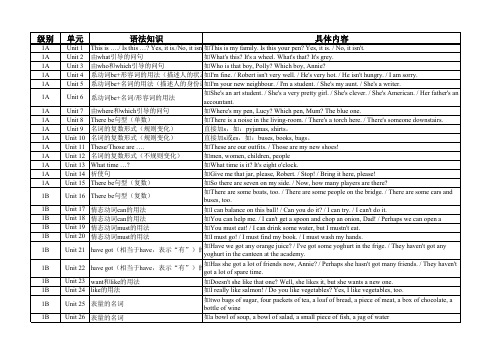
如Doesn't she like that one? Well, she likes it, but she wants a new one.
Unit 24 like的用法
如I really like salmon! / Do you like vegetables? Yes, I like vegetables, too.
Unit 21
have
got(相当于have,表示“有”)的如 y用ogH法hauvret
we got any orange juice? / I've in the canteen at the academy.
got
some
yoghurt
in
the
frige.
/
They
haven't
got
any
Unit 12 名词的复数形式(不规则变化)
如men, women, children, people
Unit 13 What time …?
如What time is it? It's eight o'clock.
Unit 14 祈使句
如Give me that jar, please, Robert. / Stop! / Bring it here, please!
2A
Unit 9 want表“意愿或想法”的用法;be goingwtaon表t的“用意法愿:”s的b. 用wa法nt to do与sb. want sb. to do
2A
Unit 10 一般现在时、现在进行时与一般将来时(一 动b般 作e 现 ,go在 一ing时 般to表 将)示 来习 时惯 表性 示或 未经 来常 要性 发的 生行的为行或为动或作动,作现。在进行时表示此刻正在发生的行为或
新概念青少版3BUnit18 Learning the rules!

一、教学主题
Unit18 Learning the rules!
二、教学目标
Learn new words and expressions/understand the text/ practice pronunciation
三、教学重难点
Be afraid that, know和mean表达的间接陈述句
Ask (someone) if/whether和know if/whether表达的间接疑问句
四、教学步骤
1
听写17单元单词
完成17单元对话练习,核对课后练习完成17单元对话表演。
Step2
播放uinit18 VIDEO
分段解析单词及重点
Step3
单词和短语讲解、图形记忆
学生依次过关
Step4
课文重点解析及情景再现
对话练习
直接陈述句VS间接陈述句;直接疑问句VS间接疑问句
Stet5
语音跟读练习、区分S/TH
句型解释,根据PPT分图片练习
Stet6
听力测试P17
六、课后作业
1、P24总结
七、教学后记
教师签字:
- 1、下载文档前请自行甄别文档内容的完整性,平台不提供额外的编辑、内容补充、找答案等附加服务。
- 2、"仅部分预览"的文档,不可在线预览部分如存在完整性等问题,可反馈申请退款(可完整预览的文档不适用该条件!)。
- 3、如文档侵犯您的权益,请联系客服反馈,我们会尽快为您处理(人工客服工作时间:9:00-18:30)。
.
精品课件
11
New words and expressions
fight
Fighting!
.
精品课件
12
Grammar
Whether 与if
引导宾语从句,一般既可用whether也可用if.
但是
(1)or not放在whether之后时,只能用whether 不用if. E.g., I don’t know whether or not he will come.
我不知道他是不是回来.
(2)在强调任意选择时,用whether…or,此时不用 if替换whether. He asked me whether I wanted to go there by train or by bus.他问我是想乘火车还
.
精品课件
13
Grammar
Whether 与if 引导宾语从句,一般既可用whether也可用if.
3. Do you think martial arts are a good thing for young people? Why? / Why not?
4. Karen says, ‘All competitors are a kind of fighting. The martial arts are also about rules.’ What do you think?
once. 我不知道是不是该立刻去那里.
.
精品课件
16
Guided Conversation
1. Would you like to learn karate? Why? / Why not?
2. What new sport or activity would you like to learn? Why?
.
精品课件
Listening and understanding
KAREN: What are you two whispering about? ROBERT: Oh, er, nothing! I’m just going upstairs. See you later, Dad! WILLIAM: Yes, of course.
.
精品课件
New words and expressions
whisper
.
精品课件
8
New words and expressions
upstairs
.
精品课件
9
New words and expressions
afraid
.
精品课件
10
New words and expressions
whether
.
精品课件
Listening and understanding
KAREN: Oh, dear! What is it, William? WILLIAM: Robert wants to learn karate. He doesn’t know whether you’ll let him.
.
他问我如果我得到那份工作是否会搬家到纽约.
(6)如果宾语从句为否定句时,则只用if不用 whether. I don’t know if it won't rain tomorrow..我 不知道明天是不是会下雨.
.
精品课件
15
用在动词不定式之前时用whether不用if. I don’t know whether to go there at
.
精品课件
Listening and understanding
WILLIAM: It’s a martial art! It’s about fighting! KAREN: All competitor are a kind of fighting. The martial arts are also about rules!
但是 (3)虽引导宾语从句,但为了强调宾语部分,也可
把从句放在句首,此时只用whether不用if. Whether he will come I am not sure. 他是不是来我拿不准. (4)从句作介词宾语时只用whether不用if. It depends on whether it will be fine. 那得看是不是晴天.
Tag line, tag line
Unit 18 Learning the rules!
Listening and understanding
ROBERT: Dad! Have you asked Mum yet? WILLIAM: What about? ROBERT: Have you asked Mum if I can start karate lessons? WILLIAM: No, I haven’t. I’ll.. Shh! She’s coming.
.
精品课件
14
Grammar
Whether 与if
引导宾语从句,一般既可用whether也可用if.
但是
(5)句子中有if引导的条件句,如再有表示“是否 ”的宾语从句,用whether不用if. He asked me whether I’d move to New York if I got the job.
.
精品课件
Listening and ቤተ መጻሕፍቲ ባይዱnderstanding
KAREN: What’s the mystery? Is Robert all right? WILLIAM: He’s fine. He just wants me to ask you something. KAREN: Why doesn’t he ask me himself? WILLIAM: He’s afraid that you’ll say no.
精品课件
Listening and understanding
KAREN: Oh, it that all! You worried me! ROBERT: Do you mean that you don’t mind? KAREN: Of course I don’t mind! Why would I mind? Karate’s a sport, isn’t it?
